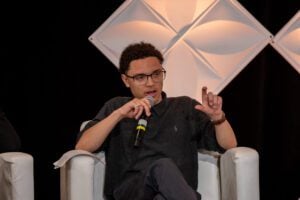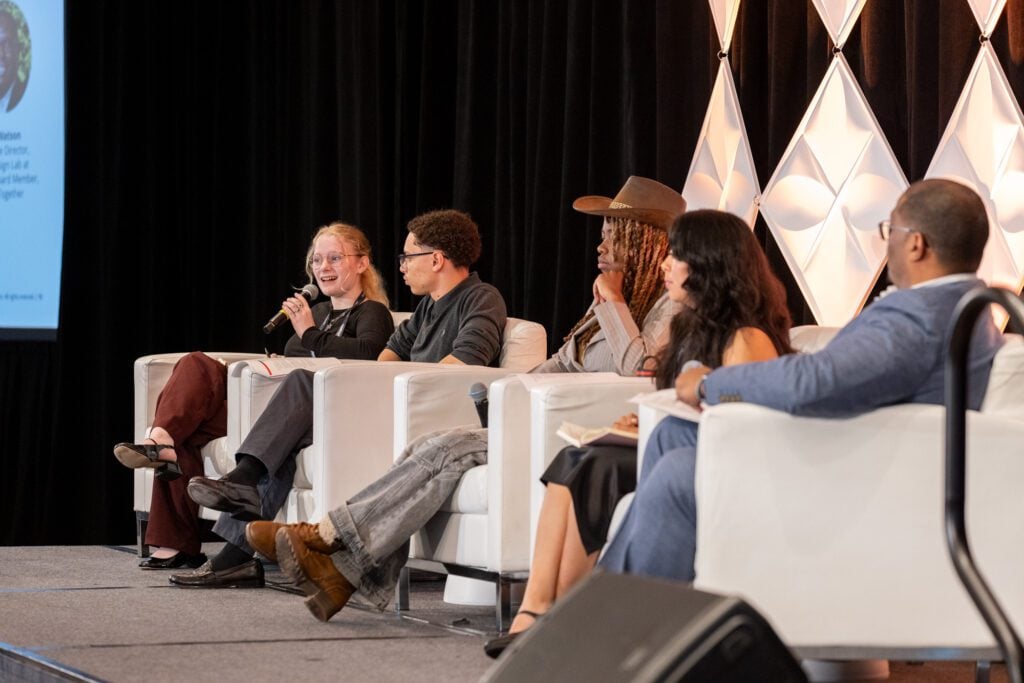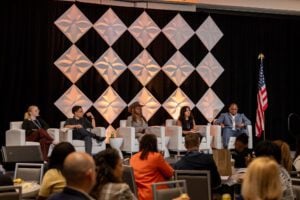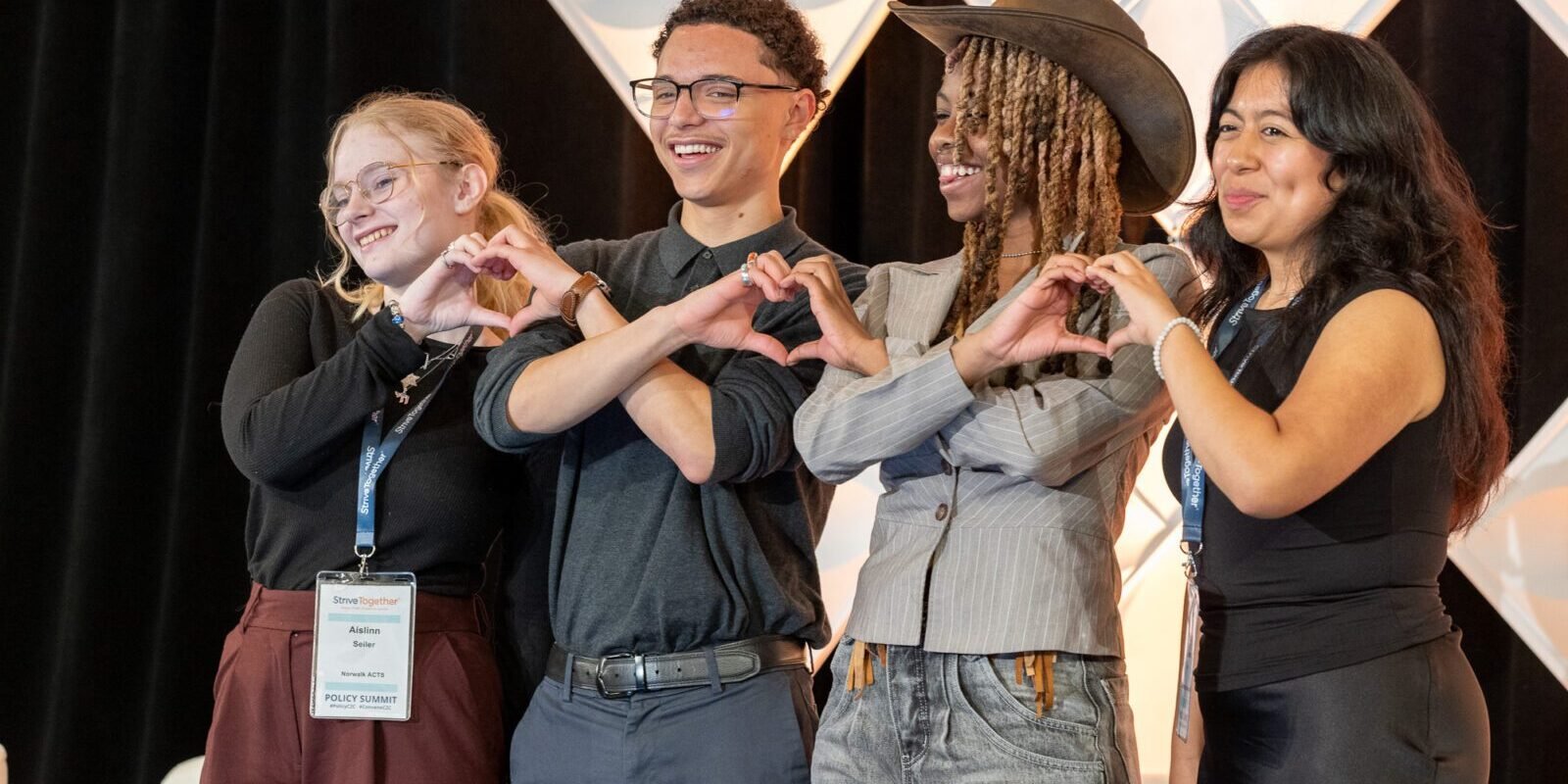At StriveTogether’ 2025 Policy Summit, four youth leaders shared how they are shaping education policy in their communities. During the Perspectives from Youth Leading Change panel, these leaders demonstrated that when young people are supported and trusted, they lead meaningful change. Moderated by Rob Watson of the EdRedesign Lab at Harvard, the conversation lifted up leadership rooted in lived experience and community connection.
 Cyrus Dean Holt, a student at Metropolitan State University of Denver, emphasized that leadership comes from shared experience and mutual support. He recalled working on a bond measure to rebuild unsafe school buildings in Adams County, Colorado, even though it wouldn’t affect him directly. He simply wanted younger students to have a safer place to learn. Cyrus’ work was part of a broader effort by youth Civic Influencers through Rocky Mountain Partnership Cradle to Career. These leaders helped secure more than $2 billion in public school funding across Colorado. In Adams County, Issue 5E led to $830 million for modernizing school buildings, rebuilding Thornton High School and expanding Career and Technical Education programs.
Cyrus Dean Holt, a student at Metropolitan State University of Denver, emphasized that leadership comes from shared experience and mutual support. He recalled working on a bond measure to rebuild unsafe school buildings in Adams County, Colorado, even though it wouldn’t affect him directly. He simply wanted younger students to have a safer place to learn. Cyrus’ work was part of a broader effort by youth Civic Influencers through Rocky Mountain Partnership Cradle to Career. These leaders helped secure more than $2 billion in public school funding across Colorado. In Adams County, Issue 5E led to $830 million for modernizing school buildings, rebuilding Thornton High School and expanding Career and Technical Education programs.
The panelists reflected on what helped them grow into leadership and what young people need to sustain it. Maria Fernanda Cifuentes remembered the impact of a mentor who shared her phone number right away, a small gesture that showed immediate trust. Maria, a rising senior at Harvard College, is spending the summer as a Cradle-to-Career Fellow through the Mindich Service Fellowship Program, working with the William Julius Wilson Institute at Harlem Children’s Zone. She created a bilingual college resource guide for students in her hometown of Chelsea, Massachusetts, and supported her peers with SAT prep and admissions interviews.
Jeffery Payne, known as “Big Jeff” in Milwaukee, shared that sometimes youth leadership begins with something as simple as presence. “Sometimes you just need a hug,” he said. “Or to hear, ‘It’s going to be okay.’” Jeffrey has brought that philosophy into his work leading literacy sessions, co-designing tutoring support and advocating for affirming environments for LGBTQ+ youth.
Aislinn Seiler, a recent graduate of P-TECH Norwalk, spoke about making advocacy joyful to keep it accessible and lasting. She worked with Norwalk ACTS and local schools to co-create a new cell phone policy and also traveled to the state capitol to advocate for school funding. “It was a good place to start on local policy that was going to affect them,” she said of the experience. “They saw our voices do matter. We do have an effect on the policy that is going to affect us. We can show up at the board of education meetings and advocate for ourselves. And I hope that the youth voices become standard practices in my district.”
A key theme emerged: the need for a civic pathway. Moderator Rob Watson asked a fundamental question — if we have career pipelines, why don’t we have civic ones? He emphasized that youth need opportunities to engage with and contribute to civic life in their own communities. This local connection helps young people see a future in the work and helps communities grow talent that reflects their values and diversity.
As he shared with the audience, “I invite you to think about how we design civic experiences in our cradle-to-career efforts on the ground that allow youth to develop over time, and how we think about that when it comes to leadership.” Watson encouraged participants to consider not just a cradle-to-career system of opportunities, but a civic continuum.

Panelists described their roles as part of a larger continuum. They weren’t just stepping into leadership for the first time. They were continuing to grow and looking for ways to deepen their impact. Their stories underscored the need for long-term support, including mentorship, fair compensation and access to networks.
Since the Policy Summit, interest in civic pathways has grown across the Cradle to Career Network. Several network members are rethinking their approaches to youth engagement. They’re exploring how to move from occasional consultation to continuous leadership roles. These shifts require structure, resources and a commitment to relationships that are reciprocal and real.
The panelists remain active in their work. Aislinn is preparing for college in Washington, D.C. Cyrus is helping expand youth civic fellowships in Colorado. Maria and Jeffrey continue their place-based efforts focused on education access, equity and safe, inclusive environments for youth.
The summit left many asking new questions. How do we build civic leadership into the systems we already support? How do we make leadership more relational, joyful and relevant to youth experience?

The answers start with small decisions that show trust. They grow through consistent mentorship and real opportunities. When youth are treated as partners, their leadership has power and permanence.
Cyrus captured this with clarity: “We don’t need adults to just hand us the mic, we need you to move over and make room on the stage.”
The path forward calls for space, support and collaboration. Building civic pathways is about creating real, meaningful ways for them to engage with civic life right now, in the places they call home. When youth can connect with the field in their own communities — whether through schools, city programs or local partnerships — they begin to see themselves as part of the solution. That connection is what turns interest into action, and action into systems change. As a Network, it’s on us to create the infrastructure that makes this possible, so every young person has the chance to lead where they live.






